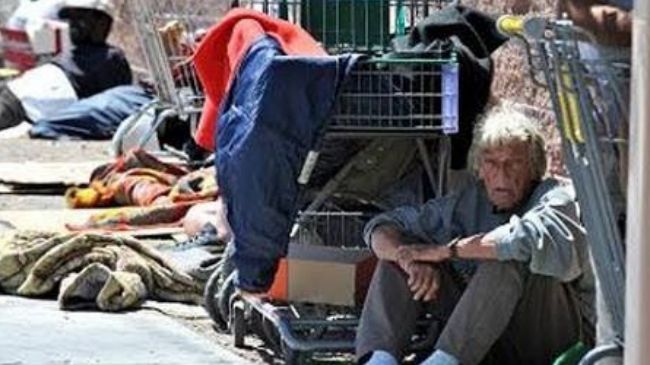Maintaining the American underclass

American history has been the history of inequality, initially racial in character, and with that irreducible flooring, and as industrialization took hold, then economic—a class-structured society with little impetus, save on the ideological level, to democratization.
The idea of a minimum wage did not break surface as legislation until well into the New Deal, and even then, conspicuous for its omissions and lack of application. The cheapening of labor has been the foundation of American progress, both in industry and agriculture, with the tenant and the sharecropper the rural equivalent of the factory laborer, both native and immigrant. From slave to wage-slave marks a natural progression, when the society’s philosophic core is the property right, and more specifically, property over humans to property over their labor power. This hierarchical arrangement of structure and values is not God-given, but presupposes domination to make it happen and continue to operate smoothly.
Flash-forward to the present. We have discussion in Congress about raising the minimum wage to $10.10, such a munificent sum (!) when considering, for example, that the National Football League’s Commissioner took home some $42M and counting last year alone—and that, chump-change to the leading hedge-fund managers. The obvious point: America has a screwed-up, inhumane system of priorities, so much so that it tellingly reveals everything about US policy-making, from the militarized insistence on global hegemony, market-penetration, and targeted assassination, all of which depend on the ethnocentric impersonalization of the Other as an object of disdain, to the domestic promotion of anomie, up through the depersonalization of the self, as the necessary way of keeping the System going.
$10.10 has a magical ring, solicitous, good-hearted POTUS, and a caring party in support, as meanwhile, the entire structure of wealth-concentration and business/banking power remains untouched, in fact, is greased to produce more disproportionate wealth and power, a raise in the minimum wage, when not resisted, likened to tossing a well-gnawed bone to a dog. I used the term “repression” above advisedly, because physical force—quite standard in the history of strikes, lockouts, Pinkertons, state and national militias, throughout American history, even antedating the Civil War—though an obvious characteristic, does not begin to exhaust its meaning. Think also: legitimated repression, in terms of hemming in the entirety of working people from meaningful life-aspirations, accomplished through fiscal and monetary policies affecting the business cycle; labor legislation; the cultural barrage, or better, onslaught, dictating psychological themes of unworthiness, self-debasement, gratitude to those going all the way up in the corporate and business world; not least, among other cultural cues in a solidified ideological universe, the unconscious genuflection to overwhelming military power, by which to identify with, yet also tacitly fear in recognition of the force society holds over its populace.
$10.10 is a way out of not confronting reality, even should it come about overnight. Workers, of course, remain workers, perhaps even further psychologically captive to the System whose wealth they create. Worker-centric industrial control is a nonstarter; public ownership equally remote, even perhaps from radical discourse. Raising the minimum wage is a species of enlightened antiradicalism, which makes of socialism the devils-brew practically akin to economic terrorism. Yet “enlightened” is not exactly the stuff of America’s ruling groups, and legitimated repression is hard to dislodge from business thinking (also shared by government). This is not to say that raising the minimum should be fought, as though a Leninist-immiserization process will lead to revolutionary activity; for whole blocs of the society now face the chilling prospect of going under, literally, at or near the stage of destitution, to which upper groups are largely blind. But, at the very least, such a raise should not be allowed to obfuscate and sidetrack discussion and action on job creation, foreclosure relief, an expanded social safety net that includes bona fide health insurance, and most important, genuine structural democratization which addresses everything from wealth-concentration and business regulation to an overweening, all-consuming military sector draining the lifeblood from American society.
My New York Times Comment to its editorial “The Clear Benefits of a Higher Wage,” (Feb. 20), follows:
It is heartbreaking to see attention focused on raising the minimum wage when a) resistance to it is puerile, almost sadistic, considering the nation’s wealth and reputation as a supposed democracy, and b) in the larger picture, class differentiation has proceeded to the point of being the widest disparities in wealth, income, and power in American history.
We seem bent on wanting to squeeze the poor, pressing them down still further, not only for the profit therein, but also as creating some psychological distance between them and the very wealthy, giving the latter greater self-justification and satisfaction. Consciously willing the degradation of labor speaks ill of a society’s commitment to simple fairness, let alone social justice. The $10.10 battle–even then not to be realized until 2016–reveals a society devoid of moral scruples and sliding precariously toward a stage of neo-fascism.
Its equivalent in foreign policy is POTUS-authorized targeted assassination; in both cases, the spirit of rule-of-law is abandoned, displaced by the arrogance of power–in one case, government, in the other, corporate America. Indeed, the two become indistinguishable.
Here again NYT can only blame Republicans. Why are not Democrats fighting harder for an increase in the minimum wage? And, again the larger picture, why are not Democrats opposing vast wealth-inequality, instead having destroyed Glass-Steagall and guided by the Rubin-Summers trickle-downers? Bipartisan consensus.







